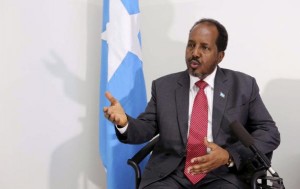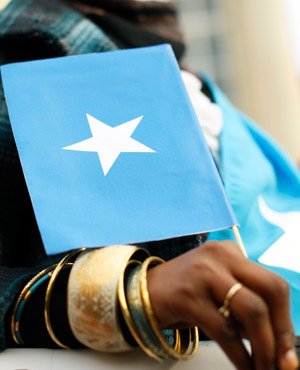By Osman Hassan
Within the month of October, we had three State of the Nation discourses delivered by three different sources. Not surprisingly, three differing faces of Somalia’s state were given as seen by these different beholders : first, it was two maverick members of Parliament known for their patriotism and outspokenness, respectively Hon Mohamed Abdi Yusuf and Hon Abdi Hashi. In an interview with the Somali Satellite TV, Universal, they painted a bleak depressing picture of a country only nominally independent but otherwise gone under the control of outsiders, principally Nicholas Kay, the Special Representative of the Secretary- General the United Nations for Somalia (SRSG) and also Ethiopia – and to a lesser extent Kenya. Judging by the reaction this interview has generated inside an outside Somalia, there is no doubt that their sentiments resonated with countless voiceless Somalis.

Their no-holds barred allegations and revelations, regarding Somalia’s bondage to outsiders, and, by implication, casting the current internationally recognized Somali government as nothing more than a fig leaf to facilitate this foreign domination, touched raw nerves in the government. As usual, its knee-jerk reaction was to muzzle the media and in this case the interviewer and director of the Station in Mogadishu were incarcerated for some days without charges only to be released in the face of domestic and world-wide outcry. Rather than redeem itself, the government’s vindictive action has only added to MPs’ indictment of the government.
Not long after the MP’s interview, President Hassan Mohamoud went on national TV, visibly brimming with elation after what he called the “successful” holding of the first round of the “Somali-owned and driven” National Consultative Forum held in Mogadishu which he chaired. Putting on his usual foxy smile, he went on the offensive against doomsayers against his presidency and presented a different rosy, promising face of Somalia. Throwing restraint over the window, he claimed progress was being achieved on every front, notably on the critical area of security and called on Al Shabaab to surrender – and not for the first time.
The problem for him is that there is so much déjà vu about his speech and, unless he is targeting the uninformed, his audiences and listeners will find it hard to relate his claims to the daily realities in Somalia. The failure of the one-vote one-man election to materialise, for which he is largely responsible, was conveniently sidetracked as if of little importance or consequence. More prominence was given to the proxy modalities for the election – a process he will steer and through it win the presidency for the second time whatever it takes- and he has what it takes to bribe his way to the top office. That thought, and the face of Somalia under Hassan for another four years presidential term, is simply too much to contemplate for many people.

The third face of the state of Somalia was given by the SRSG, Mr Nicholas Kay, who was interviewed in London on 29 October by the same TV, Universal. Bearing in mind the allegations of the Two MPs against the SRSG, perceptions shared by many others, the face of Somalia that he is shaping under his guidance deserves close scrutiny. That would start with the venue of this interview. It is not therefore without significance that the British Foreign and Commonwealth Office was chosen as the venue – Mr Kay’s former Ministry before he took up his SRSG post- and the very colonial Ministry that ruled former British Somaliland, and at one time the whole of the current Somalia after the defeat of Italy in the Second World War.
What was most striking about Mr Kay’s interview was the setting he chose for the occasion and the aura of authority and history around it. Sitting by the fireplace in an imposing room, perhaps dating back to Victorian times, and dressed in an elegant suit, Mr Kay looked every bit imperial and majestic, a scene evocative of Rule Britannia and the heyday of the British Empire. His message therefore had a taste of that of a British colonial governor reporting on the state of his dominion – Somalia – as much as that of a UN Representative.
In his typically calm British demeanour, Mr Kay’s responses to the various questions put to him were measured, well-thought and all the more credible – unlike President Hassan’s exaggerated self-satisfied posturing. He dwelt equally on the progress made without overlooking the unfinished work and the daunting challenges ahead, pointing to a light at the end of the tunnel if all pull together and presumably follow him. For better or worse, this was an impressive show of his competent stewardship and political savvy in contrast to the charlatans at Villa Somalia. The problem with his soothing message is that it is likely to lull us into false security and overlook the looming ominous endgame that lie ahead.

It is ironic that this interview should be staged at the very colonial office (albeit now called Commonwealth) which was responsible for the carve-up of the Somali homeland in the 19th Century, retaining one part – British Somaliland – but giving away the Ogaden region and Haud to Ethiopia and the Northern Frontier District (NFD) to Kenya before its independence, contrary to the overwhelming wishes of the NFD people, in a plebiscite in 1963, to unite with Somalia. It was of course done in Great Britain’s interest but the Somali people had to pay the price to the present day.
To fear that history could still repeat itself is not to indulge in frivolous far-fetched conspiracy fantasies. What we see right under our noses is the unmistakable face of the relentless dismemberment of Somalia into its former colonial constituents (North and South). It is all taking place under Mr Kay’s watch but, to be fair to him, with the willy-nilly collusion of President Hassan Sheikh and his government. Under the circumstances, the one-clan secessionist enclave calling itself Somaliland is increasingly treated for all practical purposes as a separate independent country from Somalia although Mr Kay will concede when pressed that it is technically part of Somalia to be politically correct. He said as much in the interview in an answer to one question on Somaliland.
The only hurdle to its de jure recognition is not any serious opposition from the government headed by Hassan Sheikh, or the political elite in the South who are manifestly indifferent to the unity of Somalia and for whom Somalia simply conflates with the South in all their dealings. At least in the past, the president as the custodian of the constitution, used to pay lip service to Somalia’s unity, again to be simply politically correct, but it has now disappeared from political discourse in Mogadishu. Witness the recent National Consultative Forum which was a Southern affair with the north (former British Somaliland) completely out of the equation.
Rather, the stumbling block to Somaliland’s recognition is first the international community which in general is loath to recognise clan secession lest it opens a Pandora box for similar secessions in other fragile African countries; and secondly it is the resistance of Khatumo State and other unionist clans in the North to be part of the one-clan secessionist enclave. Together, they render the aspirations of the enclave unattainable. That is not, however, a prospect shared by the secessionists – at least for now. Their calculation is that the current stand of the international community is not immutable and could change in their favour, with the support of the SRSG, if they give up on southern Somalia’s intractable instability and see Somaliland as the only viable entity worth supporting.
A parallel fragmentation process is underway in the South under the guise of a lose federation in which the emerging Member States are increasingly asserting their independence from Mogadishu and gravitating towards neighbouring countries. Their archetypical leader is Abdiweli Gaas, ironically a former Prime Minister of Somalia, who, in his Puntland fiefdom, has distinguished himself with his dogmatic clannishness and dogged defence of his enclave against Somalia as if it was always the enemy. He and his other peers in these other member States (all called Presidents) have more clout than President Hassan Sheikh. At least, they have regions they rule whereas the central government is rendered impotent and irrelevant with its writ at best confined to Mogadishu, if at all, given Al Shabaab’s presence in the capital and its deadly daily challenges. The possible break-up of Somalia between north and south, and the fragmentation of the south into disparate clan-based autonomous enclaves will shape the destiny and final face of Somalia if at all it remains as a country.
Finally, Mr Kay’s response to one particular question speaks volumes about who is incharge of Somalia, a revelation that gives credence to the allegations of the two MPs. Asked why the regions of Sool and Sanaag are not allowed to have their own State of Somalia like others, he replied that its peoples’ loyalties are divided between Somaliland, Puntland and Khatumo State. Presumably he is referring to the handful of SSC collaborators in Hargeisa and Garawe who are presented to him during his visits to these regional capitals as representing the will of the SSC people.
Until now, the conventional wisdom was that it is the Federal Government of Somalia which decides on the matter of State formation with the condition that an aspiring State should comprise two or more regions, a condition that Khatumo State satisfies. But if loyalty to an aspiring State by its citizens is to be the new condition dictated by the SRSG, he should know that the establishment of Khatumo at the historic meeting in Taleex in 20012, was unanimously endorsed by the thousands of delegates and participants attending it, comprising traditional leaders and representatives from all sections of civil society, at home and from the diaspora, a support no other State of Somalia has garnered during its formation, from Jubaland to Galmudug. Even on this loyalty basis, Khatumo should have been accepted rather than disqualified as a new federal State.
What this boils down to is that the SRSG is using this gratuitous spurious questioning of support for Khatumo among its people as a red herring to deny it its inalienable right to be a State Member of Somalia. It is a means to forcing the SSC regions to be part of Somaliland and eventually an independent one with close relations with Britain. When the SRSG can make decisions on, among other things, who qualifies for State Member of Somalia on his chosen criteria, clearly he is the one who runs the failed State. Hassan Sheik et al at Villa Somalia are merely puppets on a string. That is what the two MPs have said and we see the evidence.
Osman Hassan
email: osman.hassan2 @gmail.com
————–
Osman Hassan is a seasoned journalist and a former UN staff member. Mr Hassan is also a regular contributor to WardheerNews.


Leave a Reply